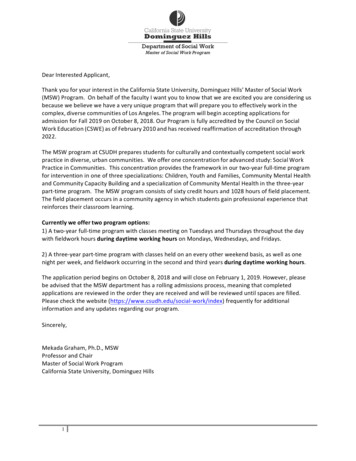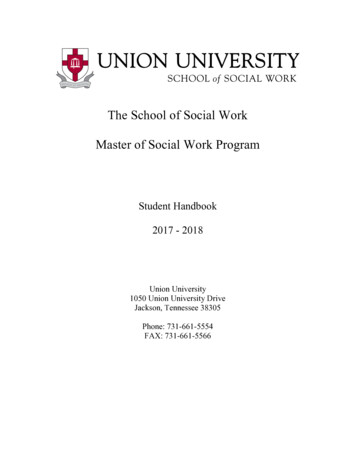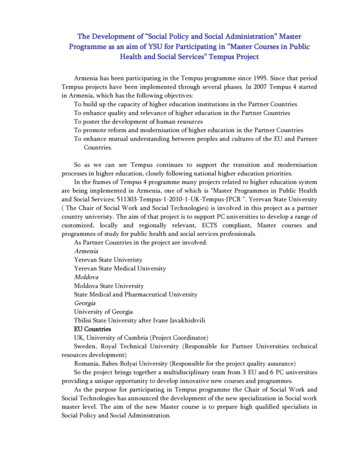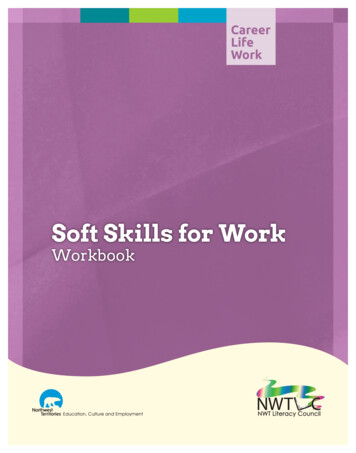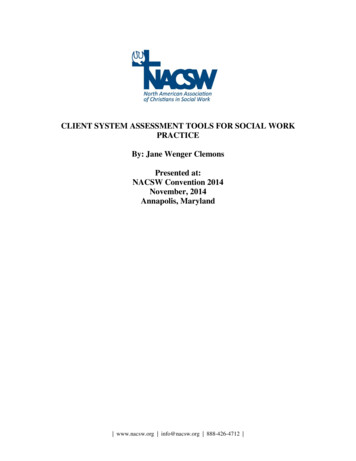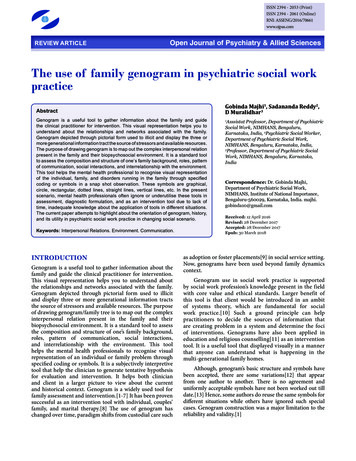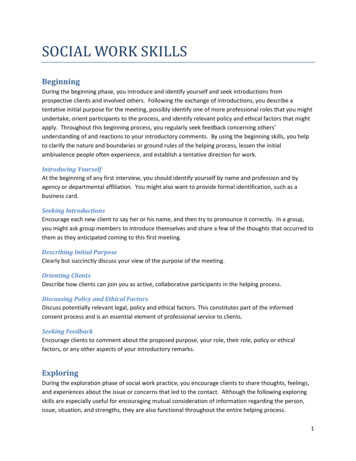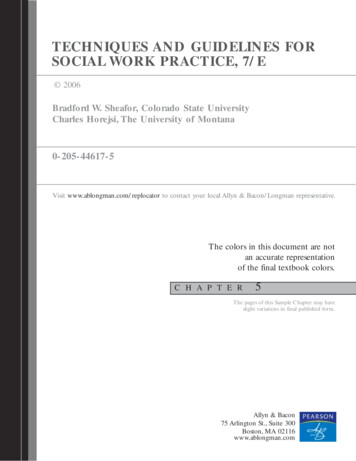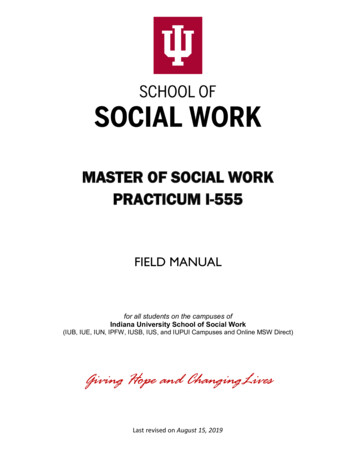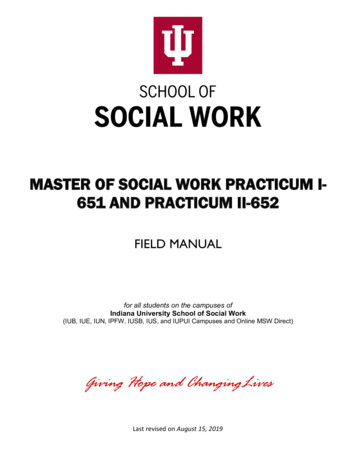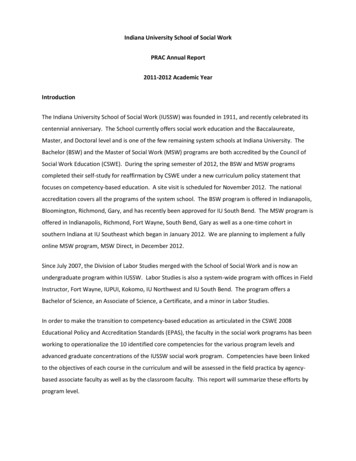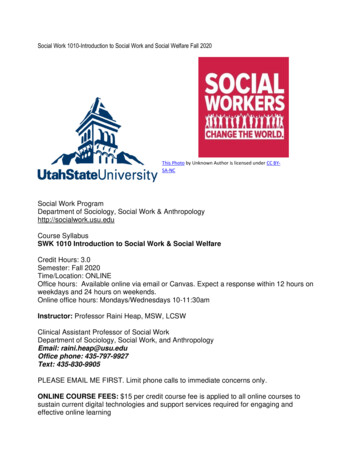
Transcription
Social Work 1010-Introduction to Social Work and Social Welfare Fall 2020This Photo by Unknown Author is licensed under CC BYSA-NCSocial Work ProgramDepartment of Sociology, Social Work & Anthropologyhttp://socialwork.usu.eduCourse SyllabusSWK 1010 Introduction to Social Work & Social WelfareCredit Hours: 3.0Semester: Fall 2020Time/Location: ONLINEOffice hours: Available online via email or Canvas. Expect a response within 12 hours onweekdays and 24 hours on weekends.Online office hours: Mondays/Wednesdays 10-11:30amInstructor: Professor Raini Heap, MSW, LCSWClinical Assistant Professor of Social WorkDepartment of Sociology, Social Work, and AnthropologyEmail: raini.heap@usu.eduOffice phone: 435-797-9927Text: 435-830-9905PLEASE EMAIL ME FIRST. Limit phone calls to immediate concerns only.ONLINE COURSE FEES: 15 per credit course fee is applied to all online courses tosustain current digital technologies and support services required for engaging andeffective online learning
Social Work 1010-Introduction to Social Work and Social Welfare Fall 2020I.COURSE MATERIALSYou are required to have the following two texts:*** (This text is available as an Auto Access text on Canvas and will be madeavailable to you on the first day of the semester-no need to purchase a hard copy)You are enrolled in the course that participates in the Auto Access program, whichprovides ONE of the required digital course materials at a significantly lower costthan traditional printed materials and are paid for through an "Auto Access" chargeplaced on your student account. This includes ONE of the required eBook and/orhomework, tests, and quizzes, etc. To access the materials, visit the Canvas coursesite and click on the “Bookshelf” link found on the left-hand side of the course. Formore details, including dates, deadlines, and opt-out information,visit: https://portal.verba.io/usu/login)1-Empowerment series: Introduction to Social Work and Social Welfare: EmpoweringPeople 12th EditionISBN: 9781305388338BY ZASTROW, CHARLESPUBLISHED BY BROOKS/COLEPUBLICATION DATE: JAN. 1, 2016*** The text below must be purchased as a hard copy-it is NOT available as an AutoAccess)Grobman, L.M. (2019). Days in the Lives of Social Workers: 62 professionals Tell“Real-Life” Stories from Social Work Practice (5th ed).***YOU MUST PURCHASE THEHARD COPY -THERE IS NOT AN ONLINE ACCESS FOR THE BOOK ISBN: 978-1929109845If you chose to order you books from the USU bookstore, please read the following message from thebookstore: All students except Logan students need to order their texts through Express-A-Book whichoperates out of the back of the USU Bookstore. Orders are shipped through UPS upon student order.When the students register at their sites, they are given a card with a toll-free number and a webaddress to order their Distance Education materials. It is their responsibility to call and order theirtextbook and syllabus. The number for Express-A-Book is 1-800-662-3950. The web address ishttp://www.bookstore.usu.edu
Social Work 1010-Introduction to Social Work and Social Welfare Fall 2020II. COURSE DESCRIPTION This introductory course explores historical andcontemporary professional social work in terms of its purpose and goals, values andethics, and its stated mission to enhance human well-being and to alleviate povertyand oppression. Students will learn about the various fields of practice found withinthe profession (i.e., child welfare, mental health and developmental disabilities,health care, criminal justice, the workplace, human diversity, aging, housing, and thehomeless, etc.) through a generalist practice perspective. Special attention will bepaid to understanding concepts of diversity and social justice and the impacts andmechanisms of oppression and discrimination.III. COURSE OBJECTIVESAt the completion of the course, students will be able to: Recognize the importance for social workers to identify as a professionalsocial worker and conduct oneself accordingly. Know how to apply social work ethical principles to guide professionalpractice Apply critical thinking to inform and communicate professional judgment Understand how social workers can engage in diversity and difference inpractice Understand the role social workers play in advancing human rights and socialand economic justiceI.D.E.A. (COURSE EVALUATION OBJECTIVES) Gaining factual knowledge (terminology, classifications, methods, trends Developing specific skills, competencies, and points of view needed byprofessionals in the field most closely related to this course Learning to apply knowledge and skills to benefit others or serve the publicgoodIV. SOCIAL WORK PROGRAMOur program offers a baccalaureate degree in social work. The social work degree isa professional degree and its basic mission is to train students for employment asbeginning, generalist social work practitioners. The program is accredited by the
Social Work 1010-Introduction to Social Work and Social Welfare Fall 2020Council on Social Work Education (CSWE) and meets requirements established bythe State of Utah for certification of social service workers. In reference to licensurein the State of Utah, graduates with a bachelor’s degree in Social Work must belicensed as social workers for employment in many social service positions. In orderto certify you must show proof of graduation from a CSWE accredited program; passthe National Bachelor Social Work exam, and the State of Utah Law and Ethics exam.Social Work Program Mission. Our mission is to serve the public by preparing ourgraduates for employment as generalist social workers through education in aprofessional foundation curriculum and selected liberal arts education, and toprepare students for advanced education, as well as responsible citizenship in theareas of service and research. The social work program is committed to enhancingthe quality of life in Utah, the nation, and the world, through service learning,leadership development, research, and extension, and is reflective of thefundamental need to adjust social institutions to the democratic and egalitarianideals of both the University and the Social Work profession. We recognize thehistoric importance of social welfare in re-balancing the country’s economic andsocial structure. The program is committed to the resolution of contemporaryhuman social problems, such as poverty, racism, discrimination, and economicinjustice. We seek to instill in our graduates a deep commitment to the profession’straditional concerns with social justice and social welfare.The Social Work program emphasizes the acquisition of generalist practiceknowledge and skills (competencies) essential to the tasks of promoting socialwelfare, especially among vulnerable populations, in institutions such as education,health, employment, housing, and criminal justice. The program is dedicated to thedevelopment of social workers who understand the need to advocate for vulnerablepopulations and to work toward the establishment of societies free from poverty,violence, oppression, and discrimination.The Social Work program seeks to accomplish its mission through a curriculum thatenables students to develop professional competencies that represent theprogram’s goals. The table below indicates how the core competencies are assessedin this class.Foundation Competencies Related to Course ObjectivesThe CSWE core competencies in this class include:1.Demonstrate ethical and professional behavior.
Social Work 1010-Introduction to Social Work and Social Welfare Fall 20202.3.5.Engage diversity and difference in practice.Advance human rights and social, economic, and environmental justice.Engage in Policy Practice
CSWE Core CompetenciesPractice BehaviorsAssessment(CourseActivities andAssignments)a. Make ethical decisions by applying the standards of theNASW Code of Ethics, relevant laws & regulations, modelsfor ethical decision-making, ethical conduct of research,and additional codes of ethics as appropriate to context.1: Demonstrate Ethical andProfessional Behaviorb. Use self-regulation to manage personal values andmaintain professionalism in practice situations.c. Demonstrate professional demeanor in behavior,appearance, and communication.e. Use supervision and consultation to guide professionaljudgment and behavior.a.2: Engage Diversity & Difference inPracticec.a.3: Advance Human Rights & Social,Economic, and EnvironmentalJustice4: Engage in Practice-InformedResearch & Research-InformedPracticeb.a.b.c.apply and communicate understanding of theimportance of diversity and difference in shaping lifeexperiences in practice at the micro, mezzo, andmacro levels.Apply self-awareness and self-regulation to managethe influence of personal biases and values in workingwith diverse clients and constituencies.apply understand of social, economic, andenvironmental justice to advocate for human rights atthe individual and system levels1, 2, 3, 5 News Media Journalengage in practices that advance social, economic,assignment, Socialand environmental justiceworker/social welfare agencyinterview and presentation.Weekly Active Learninguse practice experience and theory to inform scientific Exercisesinquiry and researchExamsapply critical thinking to engage in analysis ofProfessional Use of Selfquantitative and qualitative research methods andIn class exercises, discussions,research findingsreadings, videos.use and translate research evidence to inform andimprove practice, policy, and service deliverya.b.5. Engage in policy practicec.Identify social policy at the local/state/federal accessto social services.Assess how social welfare and economic policiesimpact the delivery of and access to social services;levels that impacts well-being, service delivery,Apply critical thinking to analyze, formulate, andadvocate for policies that advance human rights andsocial, economic, and environmental justice.
Social Work 1010-Introduction to Social Work and Social Welfare Fall 2020a.6: Engage with Individuals, Families,Groups,Organizations, and Communities.b.a.b.7: Assess Individuals, Families,Groups, Organizations, andCommunitiesc.d.apply knowledge of human behavior and the socialenvironment, person-in-environment, and othermultidisciplinary theoretical frameworks to engagewith clients and constituenciesuse empathy, reflection, and interpersonal skills toeffectively engage diverse clients and constituenciescollect and organize data, and apply critical thinkingto interpret information from clients andconstituenciesapply knowledge of human behavior and the socialenvironment, person-in-environment, and othermultidisciplinary theoretical frameworks to engagewith clients and constituenciesdevelop mutually agreed-on intervention goals andobjectives based on the critical assessment ofstrengths, needs, and challenges within clients andconstituenciesselect appropriate intervention strategies based onthe assessment, research knowledge, and values andpreferences of clients and constituenciesa.8: Intervene with Individuals,Families, Groups, Organizations, andCommunities9: Evaluate Practice withIndividuals, Families, Groups,Organizations, and Communitiescritically choose and implement interventions toachieve practice goals and enhance capacities ofclients and constituenciesb. apply knowledge of human behavior and thesocial environment, person-in-environment, andother multidisciplinary theoretical frameworks toengage with clients and constituenciesd. negotiate, mediate, and advocatewith and on behalf of diverse clientsand constituenciese. facilitate effective transitions and ending thatadvance mutually agreed-on goalsa.critically analyze, monitor, and evaluateintervention and program processes andoutcomesMental Health and Stress ManagementAs a student you may experience a range of issues that can cause barriers to learn(e.g., strained relationships, increased anxiety, alcohol/drug problems, feelingdown, difficulty concentrating and/or lack of motivation). These mental healthconcerns or stressful events may lead to diminished academic performance and2
Social Work 1010-Introduction to Social Work and Social Welfare Fall 2020may reduce your ability to participate in daily activities. Utah State Universityservices are available to assist you. You can learn more about the broad range ofconfidential mental health services available to USU students via thesewebsites: duateschool/mental-health/V. UNIVERSITY & PROGRAM POLICIESNondiscrimination Policy All aspects of the social work program are conductedwithout discrimination on the basis of race, gender, age, religion, national origin,and disability, veteran’s status, or sexual orientation. The AffirmativeAction/Equal Opportunity Office at Utah State University is responsible foroverseeing compliance of a wide variety of federal/state laws, Executive Orders,and University policies that address equal opportunity in employment andeducation. Ultimately, it seeks to institutionalize affirmative action and equalopportunity concepts in everyday operations and activities. To accomplish thisgoal, it: (1) advises and assists the Utah State University community in ensuring anequal opportunity environment free of discrimination and sexual harassment and(2) assist with proactive efforts to create a gender and ethnically diversecommunity of students, faculty and staff, in order to redress imbalances andenrich the University experience.USU Policy Number 303 On Affirmative Action/Equal OpportunityUtah State University ensures equal opportunity in all aspects of employment,programs and activities and prohibits discrimination based on race, gender, age,religion, national origin, disability, veteran’s status, or sexual orientation. Inaddition, USU policy number 339 specifically prohibits sexual harassment in theworkplace. Also, USU policy number 305 provides for discrimination complaintprocedures. The Affirmative Action/Equal Opportunity office provides informationand educational programs regarding equal opportunity and affirmative actionincluding sexual harassment preventive training and diversity training; assists insetting goals and timetables for hiring; monitors hiring procedures, implementsthe grievance procedures for discrimination; and oversees the University’saffirmative action plan. For further information, please call (435) 797-1266.Classroom Accommodation For Students With DisabilitiesReasonable accommodation will be provided for students with documenteddisabilities. If you have a disability documented by the Disability Resource Center3
Social Work 1010-Introduction to Social Work and Social Welfare Fall 2020(University Inn 101, (435) 797-2444) – and need reasonable accommodation toparticipate in this course, please visit with the instructor immediately to arrangethe necessary reasonable accommodation. Course materials may be requested inalternative formats through the Disability Resource Center.Academic and Professional ExpectationsAcademic dishonesty of any sort will not be tolerated. You are advised to obtain acopy of the Code of Policies and Procedures for Students at Utah State Universityand refer in particular to the passages on academic dishonesty and disciplinarymeasures. You are to familiarize yourself with what constitutes plagiarism and toavoid it. Plagiarism is “knowingly representing by paraphrase or direct quotationthe published or unpublished work of another person as one’s own in anyacademic exercise or activity without full and clear acknowledgment” (Code ofPolicies and Procedures for Students at Utah State University, p. 10). Plagiarismwill not be tolerated and ignorance of what constitutes plagiarism is no excuse.Respecting Confidentiality in Course AssignmentsA salient issue for students during practice is respecting the confidentiality ofclients, client records, and activities that occur while in the field. These caninclude interactions with agency staff and other social work professionals.Consequently, it is expected that students will adhere to the NASW Code of Ethicswith regard to professional and ethical conduct. Students are to respect client andagency confidentiality in their written course assignments by refraining from theuse of actual names or specific identifying information regarding actual theirclients.Given the vast variety of human experience, it is entirely possible that studentstaking this course may have experienced some aspect of the topics discussed inclass. No one will be asked to self-disclose sensitive information in class andstudents should seriously consider the ramifications of such disclosure as you willspend considerable time with your classmates throughout the course. However, ifanyone does disclose their personal experience, class members are bound to keepthis information confidential and treat such disclosure as sensitive, private, andnot for out-of-classroom discussion.4
Social Work 1010-Introduction to Social Work and Social Welfare Fall 2020Withdrawal Policy And "I" Grade PolicyStudents are required to complete all courses for which they are registered by theend of the semester. In some cases, a student may be unable to complete all ofthe coursework because of extenuating circumstances, but not due to poorperformance or to retain financial aid.The term 'extenuating' circumstances includes:(1) Incapacitating illness which prevents a student from attending classes for aminimum period of two weeks,(2) A death in the immediate family,(3) Financial responsibilities requiring a student to alter a work schedule tosecure employment,(4) Change in work schedule as required by an employer, or(5) Other emergencies deemed appropriate by the instructor.Your Responsibilities As A LearnerIt is expected that students will complete all learning modules, required quizzes,and assignments. It is the student’s responsibility to obtain all missed materialand assignments and notify the instructor ahead of time if deadlines cannot bemet. Late assignments will not be accepted unless prior arrangements have beenmade. All questions and concerns regarding the class can be directed to theinstructor at the email address provided in the syllabus.Know ThyselfThe effective “use of self” in social work practice is vital. Students should takeevery opportunity to develop awareness related to personal biases that mayadversely impact your work with future clients. The better you know yourself, thebetter equipped you can be to get to know different clients and empower them tomeet vital needs.Preventing Sexual HarassmentTitle IX of the education amendments of 1972 prohibits sex discrimination againstany participant in an educational program or activity that receives federal funds,including Federal loans and grants. Title IX also covers student-to-student sexualharassment. If you encounter unlawful sexual harassment or gender-baseddiscrimination, please contact the Personnel Services Office at 9510 Old Main Hill,Logan, UT 84322, (435) 797-1805.5
Social Work 1010-Introduction to Social Work and Social Welfare Fall 2020Social Work Program Participation Policy:This course is an interactive ONLINE course. You are expected to participate bycontributing to ALL ONLINE class discussions and be actively engaged in ALLONLINE class activities. The Canvas course page has class information and includesactivities and assignments that will be assigned. The course syllabus providesinformation for the course. It is a student’s responsibility to utilize it as a guideand to contact the instructor for any clarification. The professor reserves theprivilege of making changes to the syllabus-including changes to the readingschedule, assignment expectations, and grading structure. Students will be givenfair warning of any changes. Class participation requires that the studentcontribute to class discussions and hand in all assignments on time.VI. COURSE ASSIGNMENTSLate work policy "Life Happens" waiver. This policy allows a student to submitONE late assignment during the semester- NO QUESTIONS ASKED. Thisassignment will not receive full credit but may be eligible for up to 80 percentcredit based on the quality of work submitted. This waiver may only be usedONCE during the semester and the student must inform the instructor via Canvasemail that the waiver is being used.Without the one-time use of the Life Happens waiver, late work will not beaccepted. It is up to the instructor's discretion to make an exception to the latework policy.There are several assignment modules this semester, each of which will give youthe opportunity to explore and better understand the social work profession andthe social work competencies and practice behaviors. The assignments and theirdue dates are detailed below.ASSIGNMENT 1: Chapter reading quizzesThere will be 4 chapter reading quizzes that will cover multiple chapters. They areopen-book and open note and DO NOT need to be proctored. These quizzes areintended to encourage students to read, study, and retain the material and tobecome better acquainted with the concepts that are being presented. (40 pointseach. Total 160 (points).6
Social Work 1010-Introduction to Social Work and Social Welfare Fall 2020ASSIGNMENT 2: News Media Portfolio journal (Part One 4 news posts @30points each. Part Two 1 Response paper @80 points for 200 points total)Part 1: (120 points) Throughout the semester you will be expected to post on thenews media discussion board the week it is due (no working ahead because youwant to have current issues being addressed) 4 times throughout the semesterand comment about a news story you have identified for that week that hasrelevance to any social work topic. You MUST also post a response to at leastTWO classmates’ post each week.In addition to Part 1, prior to the end of the semester you will be expected tocomplete the following part 2:Part 2: (80 points) Write a one-page response paper that summarizes how thenews assignment has helped to expand your awareness of current informationabout social welfare issues, policies, and programs. At the end of the semester tocomplete the news media journal portfolio, part two requires a FULL one -twopage double spaced response indicating what the process of following the newsduring this semester has taught you about the importance for a social worker tobe informed about the issues in our community and our country Base yourreflection of your learning on the entire process of following the news. How haveyour thoughts and beliefs about social work evolved over the course of followingthe news?***The goal of this assignment is to expand your awareness of currentinformation about social welfare issues, policies, and programs. As you follow thenews over the course of the semester, look for news media articles related to ourcourse content. JUST ABOUT ANY NEWS STORY CAN BE RELATED TO SOCIALWORK- DON’T OVERLOOK THAT THERE ARE MANY POSITIVE NEWS STORIES TOSHARE AND DISCUSS!Use standard news sources such as local and national TV news stations, NY Timesonline, Chicago-Sun Times, Huffington Post, The Salt Lake Tribune, KSL, DeseretNews, CNN, MSN, FOX, or other similar sites. Pop culture sites or blogs areunacceptable news sources, as are journal articles from your other socialscience classes.7
Social Work 1010-Introduction to Social Work and Social Welfare Fall 2020ASSIGNMENT 3– Days in the Lives of Social Workers: 1 Page Reflection Paper.(75 points) Describe in a one page reflection paper the most useful informationyou read in this book that supports or dissuades (or both if applicable) your choiceto pursue a career in the social work profession and how your understanding ofsocial work in general has changed over the course of the semester.ASSIGNMENT 4: Social Worker and Agency Interview presentation. (225points)Interview a social worker (not a psychologist, behavioral analyst etc.) whoworks/has worked in a social service agency or private practice. Additionally, forthis assignment, you MUST also interview a representative of a social serviceagency and gather information about the agency by asking the agency questionsbelow. It is permissible to use the social worker you have interviewed to alsoanswer the agency questions – however, it is highly encouraged that youragency interview is conducted with a representative of a different agency togive you more exposure to different social work settings. To complete thisassignment, you will compile the social worker interview answers and the agencyrepresentative answers into ONE power point/Google docs/prezi etc.presentation. Post your presentation on the discussion board so that yourclassmates can review it and make comments. In addition, you are expected tomake a comment to at least two classmates’ presentation pointing outsomething from their presentation that interested you.Keep your presentation limited to 10-15 slides. Follow the rubric below.SOCIAL WORKER INTERVIEW QUESTIONS:1. Interview a Social Service Worker (SSW) or CSW/LCSW from a social welfareorganization, private practice, adoption agency, another specific social servicesprogram that interests you ie. DCFS, Head Start, Boys and Girls Club, AA, At-RiskYouth program etc. This list is not limited. Consider the vast array of social worksettings that are around you.2. Visit with the social worker and conduct the interview asking the following 8questions with the final question your reflection. Compile the answers along withthe agency answers in a presentation format:The presentation must include the following information: What are the job duties and responsibilities of the social worker? What is the educational background and licensure of the social worker? Why did the social worker choose to work for the organization?8
Social Work 1010-Introduction to Social Work and Social Welfare Fall 2020 What is the most rewarding aspect of their work?What is the most challenging aspect of their work?What is a typical day on the job like?If they had a "magic Social Worker" wand - what would they do?What are their words of wisdom to future social workers?Reflect on your interview – Is this agency a good fit for you? (i.e. Would youlike to work for the organization you visited? Why or why not?)AGENCY INTERVIEW QUESTIONS:Contact a social service agency representative and ask the followingquestions and include the answers in the PowerPoint presentation (you canuse the agency the social worker you interviewed works for or you canspeak with a different agency).You must answer the following eightquestions about the agency: Describe the organization or program (i.e. for profit, non-profit,government, etc.) Describe the target population served by the organization or program Describe the services provided to the target population Describe how the organization or program is funded. Describe the purpose of the agency or program How many social workers are employed with the agency? Does the agency collaborate with other community agencies and if so,which ones? Is this an agency you would be interested in working for? Why or why not?ASSIGNMENT 5: Discussion Board Questions and application 6@ 25 points 150pointsAfter reading the assigned chapter in the Zastrow text, students will be given adiscussion board question to complete. For each discussion, post a thoughtfulresponse to the question using the critical thinking skills of analyzing, interpreting,reflecting, evaluating, and decision making. Posts should be at least a fullparagraph and portray the student has considered the question from a socialwork generalist practice framework and is not simply agreeing or disagreeing withwhat was said. The replies must be respectful of the viewpoints and thoughts ofothers.9
Social Work 1010-Introduction to Social Work and Social Welfare Fall 2020Waiting until the day before the due date to make a post and give responsesdoes NOT show engagement in thoughtful discussion, and for grading purposes,and will negatively affect the assigned grade.In addition to their own post, students must post a reply to the post of at least 2other students. Discussion posts and replies should use critical thinking skills, besubjective and respectful of the viewpoints and thoughts of others. If an activity isalso assigned for that chapter then it should be completed and submitted onCanvas under the assignment tab.ASSIGNMENT 6: Graded activities 14@ 10 points 140 pointsThere will be graded activity assignments that may include worksheets, videos,chapter interactive online activities etc. The activities will have an assignment andsubmission description***When submitting assignments, students are to respond in a mannerconsistent with the Code of Ethics and CSWE competencies. Individually,students can hold any values they want, however, this is a Social Work class andas such, all assignment submissions are expected to be compatible with thesocial work professional values and standards of the CSWE competencies.I have attached a link to the CSWE competencies and a link to the NASW Codeof Ethics.I ask all students to think about assignment submissions and consider if they areconsistent with the social work profession’s values and competencies beforethey are submitted for /Code-of-Ethics (Links to an external ry.pdf.aspxVII. GRADING CriteriaAssignment 1: Chapter reading quizzes 4 @ 40 points each 160 points10
Social Work 1010-Introduction to Social Work and Social Welfare Fall 2020Assignment 2: News Media Journal Portfolio part one (4 discussion posts withresponses) 4@ 30 points 120 points /part two-reflection paper 80 points total200 pointsAssignment 3: Days in Lives of Social Workers reflection response 75 pointsAssignment 4: Agency Visit and social worker interview with presentation andpost on dis
Jan 01, 2016 · the National Bachelor Social Work exam, and the State of Utah Law and Ethics exam. Social Work Program Mission. Our mission is to serve the public by preparing our graduates for employment as generalist social workers through education in a professional foundati
